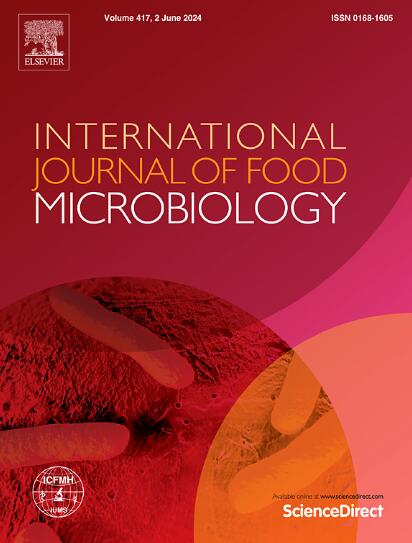Temperature-driven microbial assembly and flavor compound dynamics in high-temperature Daqu: Adaptive co-evolution for efficient Tetramethylpyrazine production
IF 5
1区 农林科学
Q1 FOOD SCIENCE & TECHNOLOGY
International journal of food microbiology
Pub Date : 2025-06-17
DOI:10.1016/j.ijfoodmicro.2025.111325
引用次数: 0
Abstract
High-temperature Daqu, as a key starter, initiates the solid-state fermentation of Maotai-flavored Baijiu and substantially influences its flavor profile. Tetramethylpyrazine (TTMP), a key flavor compound in high-temperature Daqu and Maotai-flavored liquor, exhibits unique pharmacological properties, imparting nutty and roasted aromas. This study is based on temperature driven microbial assembly and flavor compound changes in high-temperature Daqu, combined with modular community construction methods and temperature adaptive co-evolution strategies, effectively increasing the content of TTMP. First, through correlation analysis of flavor components, microbial communities, and physicochemical properties during high-temperature Daqu fermentation, we found that temperature drives microbial assembly and TTMP synthesis (r = 0.68, P < 0.05), and that Bacillus, Lactobacillus, and Saccharomyces are strongly correlated with TTMP synthesis (P < 0.05). Subsequently, these strains were screened, and a modular approach was employed to construct a microbial community for TTMP synthesis. Given the continuous high-temperature conditions during the fermentation process of Daqu, we developed a temperature-tolerant and high-yielding synthetic community through a temperature-adaptive co-evolution strategy. Finally, using the evolved synthetic community for laboratory simulation fermentation, the TTMP yield reached 328.5 mg/kg, which was 1.8-fold higher than the pre-evolutionary community simulation fermentation (178.6 mg/kg). In summary, this study significantly increased the yield of TTMP through the temperature-adaptive co-evolution of synthetic communities, offering new ideas and strategies for the targeted regulation of Daqu flavor compounds.
高温大曲中温度驱动的微生物组装和风味化合物动力学:高效四甲基吡嗪生产的自适应协同进化
高温大曲是茅台酒固态发酵的关键发酵剂,对茅台酒的风味有重要影响。四甲基吡嗪(Tetramethylpyrazine, TTMP)是高温大曲和茅台酒的重要风味化合物,具有独特的药理作用,具有坚果和烘烤的香气。本研究基于高温大曲中温度驱动的微生物组装和风味化合物变化,结合模块化群落构建方法和温度适应性协同进化策略,有效提高TTMP的含量。首先,通过对大曲高温发酵过程中风味成分、微生物群落和理化性质的相关性分析,我们发现温度驱动微生物组装和TTMP合成(r = 0.68, P <;Bacillus、Lactobacillus和Saccharomyces与TTMP合成密切相关(P <;0.05)。随后,对这些菌株进行筛选,并采用模块化方法构建TTMP合成微生物群落。针对大曲发酵过程中持续的高温条件,我们通过温度适应协同进化策略,培育出了一个耐温高产的合成菌群。最后,利用进化后的合成群落进行实验室模拟发酵,TTMP产量达到328.5 mg/kg,比进化前的群落模拟发酵(178.6 mg/kg)提高了1.8倍。综上所述,本研究通过合成群落的温度适应性协同进化,显著提高了TTMP的产量,为大曲风味化合物的靶向调控提供了新的思路和策略。
本文章由计算机程序翻译,如有差异,请以英文原文为准。
求助全文
约1分钟内获得全文
求助全文
来源期刊
CiteScore
10.40
自引率
5.60%
发文量
322
审稿时长
65 days
期刊介绍:
The International Journal of Food Microbiology publishes papers dealing with all aspects of food microbiology. Articles must present information that is novel, has high impact and interest, and is of high scientific quality. They should provide scientific or technological advancement in the specific field of interest of the journal and enhance its strong international reputation. Preliminary or confirmatory results as well as contributions not strictly related to food microbiology will not be considered for publication.

 求助内容:
求助内容: 应助结果提醒方式:
应助结果提醒方式:


